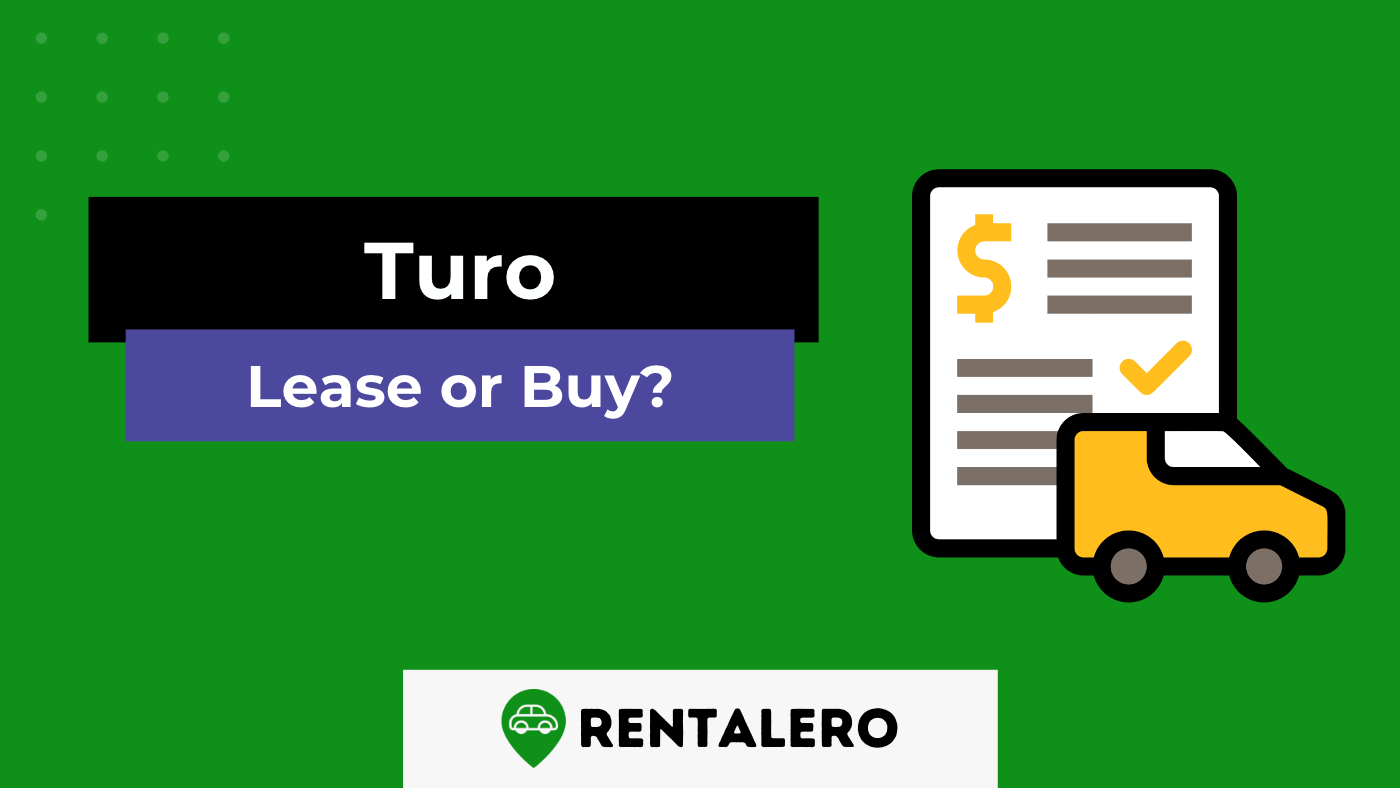So, you’re ready to be a Turo host but stuck at a crossroads, asking yourself: Should I lease or buy a car for Turo? It’s a tricky question, but don’t sweat it!
Both options carry their unique advantages and challenges.
In this article, we’ll dive into everything you need to know to make an informed choice between leasing or buying a car for Turo. In addition, you will receive practical advice and tips on how to go about the process.
Advertising links are marked with *. We receive a small commission on sales, nothing changes for you.
Key Takeaways
- Leasing and buying a car for Turo have pros and cons, making the decision dependent on personal circumstances and preferences.
- Leasing typically offers lower monthly payments but has potential limitations, such as mileage restrictions and wear and tear charges.
- Buying a car involves higher upfront costs but provides more freedom in usage and the possibility of resale value.
- Assess your financial situation, expected mileage, long-term plans, and personal preferences before deciding on leasing or buying a car for Turo.
- Successful Turo hosts have thrived using leasing and buying options, making it important to choose the path that best fits your needs and circumstances.
Understanding Car Leasing
So, what’s car leasing all about?
It’s a bit like renting a flat. You pay a monthly fee to drive a new car, usually for a few years. Then, you hand the car back to the leasing company at the end of the lease. Simple, right?
Pros of Leasing a Car
- You get a shiny new car without paying the full cost upfront.
- Your monthly payments can be lower compared to a car loan.
- Maintenance costs are often included, giving you peace of mind.
Cons of Leasing a Car
- You don’t own the car. It’s like living in a rented apartment—you’re not building equity.
- There are mileage limits, and going over them can cost you.
- Wear and tear beyond “normal” can incur extra charges.
Understanding car buying
On the other hand, buying a car is like buying a house. You pay for it, and it’s yours, either outright or after you’ve paid off a loan.
Pros of Buying a Car
- You own the asset and can use it as you wish. Want to paint it purple and add a spoiler? Go for it!
- There are no mileage restrictions. Drive it or rent it out as much as you want.
- You can sell the car whenever you want.
Cons of Buying a Car
- Upfront costs can be high, especially for new vehicles.
- Depreciation can take a bite out of your investment.
- Maintenance and repair costs are on you.
Financial Considerations
Ever heard of the saying, “Money talks?” Well, it certainly does when leasing or buying a car for Turo. So let’s break down the costs.
Initial costs
Leasing usually requires a lower down payment or sometimes none at all!
Monthly payments
These are typically lower than car loan payments, as you only pay for the vehicle’s depreciation during the lease term.
End of lease
If you decide to buy the car at the end of the lease, be prepared for a balloon payment. With lower upfront and monthly costs, leasing might seem like a great deal for Turo. But remember, there are mileage restrictions. Those extra charges could affect your profits if your Turo rentals clock up more miles than allowed.
Buying and its Financial Implications
Initial costs
Buying a new or used car requires a larger initial outlay, especially if you’re paying cash upfront.
Monthly payments
If you’re taking a loan, your monthly payments will be higher than leasing, but remember, you’re working towards ownership.
Longterm costs
Once you’ve paid off the loan, it’s yours. No more monthly payments, more profits from your Turo rentals!
Buying a car for Turo could mean higher profits in the long run, especially if you’re renting it out frequently and clocking up high mileage. But on the other hand, consider the potential maintenance costs and the impact of depreciation if you decide to sell.
Risks and Responsibilities
Driving, leasing, or buying a car for Turo comes with risks.
Risks with Leasing a Car for Turo
Excess mileage
As we’ve mentioned, leasing comes with mileage limits. Exceed these, and you’ll face extra charges.
Wear and tear
Lease agreements have a “normal wear and tear” clause. Therefore, if your Turo renters return the car with more than “normal” dings and scratches, you could be on the hook for additional costs.
Early termination
Ending the lease early could result in hefty penalties.
Risks of Buying a Car for Turo
Depreciation
Cars lose value over time, and high mileage can speed up this process.
Maintenance and repairs
As the owner, you’re responsible for keeping the car in tip-top shape.
How do you manage these risks? Here’s a tip: comprehensive insurance is necessary for leasing and buying. Also, setting clear rental guidelines for your Turo renters can help avoid unnecessary wear and tear.
Key Questions to Ask Yourself
Leaping to become a Turo host can feel like a big step, but don’t worry! Here are some key questions to help you decide whether to lease or buy.
- How much can I afford upfront?
Leasing usually requires less money upfront, while buying might require a heftier sum.
- What’s my monthly budget?
Remember, leasing generally has lower monthly payments than buying.
- How many miles will the car travel?
Consider your potential renters and how far they might travel.
- How long do I plan to keep the car?
If you’re thinking short-term, leasing might be a good option. However, consider buying if you’re in it for the long haul.
And here’s a super tip Try not to rush the decision. Instead, take your time to understand the costs and benefits of both options.
Research, ask questions, and maybe even chat with other Turo hosts. Remember, the goal is to create a profitable Turo business that fits your lifestyle and budget.
Conclusion
We’ve explored the ins and outs of leasing and buying a car for Turo. We’ve covered everything from understanding the basics to crunching the numbers. Both paths have their perks and pitfalls. Your choice depends on your financial situation, mileage needs, and long-term plans.
Remember, there’s no one-size-fits-all answer. So, take a deep breath, evaluate your options, and choose the path that best aligns with your goals. You’ve got this!
Frequently Asked Questions
Is it better to lease or buy a car for Turo?
There isn’t a definitive answer to this question, as it largely depends on your situation, including your financial status, how much you’re willing to invest, your anticipated mileage, and your long-term plans.
Can I lease a car specifically to put it on Turo?
Yes, you can, but it’s crucial to check the terms of your lease agreement. For example, some leasing companies have restrictions on using their vehicles for commercial purposes.
What are the financial implications of leasing versus buying a car for Turo?
When you lease a car, you’ll typically have lower monthly payments than buying one. However, it would be best if you also considered mileage limits and potential wear and tear charges.
On the other hand, buying a car means higher upfront costs but greater freedom in usage and potential resale value.
What risks are associated with leasing or buying a car for Turo?
Both options come with their own set of risks. With leasing, you might face excessive mileage and wear-and-tear penalties. For buying, the car’s depreciation, maintenance costs, and potential difficulty in selling the car later are significant factors.
How can I decide whether to lease or buy a car for Turo?
Consider your financial situation, anticipated mileage, how long you plan to use the car for Turo, and your personal preferences. It’s also helpful to consult with a financial advisor or use online calculators to compare the costs of leasing vs. buying.

Nzoputa has been writing for Rentalero since day one and is one of our most experienced members when it comes to the rental industry. For her, nothing beats Uber!
Advertising links are marked with *. We receive a small commission on sales, nothing changes for you.

